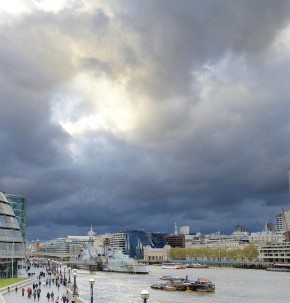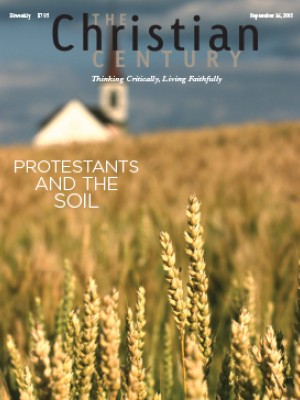Walking toward the storm

In March 1990 the European rugby union championship lay in the balance. Scotland and England had both won all their matches, and England traveled to Edinburgh knowing that the winner would take the coveted Grand Slam. The game was perhaps the finest in Scottish rugby history. But the defining moment came before it started. The England players ran onto the field to a largely hostile reception, but the Scots’ captain David Sole did something different. He led his team out at a stately walking pace. It was an iconic moment. It said, “There’s nothing you can throw at us we can’t deal with. We’re going to win this game, and we’re going to walk right toward you, and we will not be overcome.” And that’s what happened. England threw everything at Scotland, but to no avail. And David Sole’s walk became part of Scottish folklore.
Get into David Sole’s mind for a moment. This is the defining moment of my life, in my nation’s cultural life. What happens in the next two hours will be my identity, my legacy, my single truth. And I’m walking slowly toward it. I’m entering the eye of the storm.
Read our latest issue or browse back issues.
Perhaps you are facing a storm. Your life, or the joy in your life, or the well-being of someone you treasure, seems to hang by a thread. Your instinct is to dodge, escape, deny, dive for cover, find a way out, run away. Everything is telling you to close your eyes and wait for it to go away, let it sort itself out, to go to sleep and discover it was all a bad dream, or to invite a fairy godmother to wish this moment away.
Could it be that God is calling you gently and quietly, not to deny, flee, or distract yourself but to walk toward the eye of the storm? Of course some dramas are best avoided; some wounds are not things to dwell on. But I believe that for each one of us there’s a David Sole moment, a defining storm in which everything we are and are called to be comes together in a moment we can’t avoid or deny.
Let’s take an inventory of what walking toward the storm would mean.
It would mean going into your bottomless fear, naming it, facing the worst thing that could happen, feeling the impact of that thing, and then trusting that God will meet you so that you go through and beyond your fear and out the other side. That’s courage. Trembling courage.
It would mean facing up to the unspeakable waste, the dream of what your life was supposed to be, the template for what you thought God had in store for you, the good things you thought you were entitled to hope for—the goals, prospects, and options—and instead focusing on this thing you’re walking toward as perhaps the only thing God wants you to concentrate on right now, and believing that God will look after the rest. That’s trust. Quavering trust.
It would mean entering into the convulsing grief, loss, fear of separation, of isolation, of not mattering any more, of being snuffed out like a candle, of it seeming as if you’d never been, of having no meaning to your life except what God makes for you, and believing that that’s all that counts. That’s faith. Shuddering faith.
It would mean accepting the prospect of harrowing pain of uncertain duration, unpredictable depth, and relentless intensity with no protection except the everlasting arms, and believing those arms will never let you go. That’s hope. Quaking hope.
Fear, waste, grief, pain. That’s what it means to walk toward the storm. Courage, trust, faith, hope. That’s what we look for in the defining moments of our lives.
This isn’t the way our culture teaches us to address the storm. Our culture teaches us to fix the problem and, if we can’t fix the problem, to learn better techniques, apply stronger systems, use more advanced technology. Our culture has nothing to tell us about a storm we can’t control—it tries to manage storms so as to make virtues like courage, trust, faith, and hope unnecessary.
But maybe that’s precisely what you’re facing today. A storm you can’t control. A storm that’s coming right toward you.
The Christian faith is that God in Christ walked toward the eye of the storm. Jesus didn’t deny, avoid, or escape Jerusalem. Jesus took up his cross and walked toward Golgotha, beyond trembling fear, in spite of criminal waste, amidst echoing grief, embodying terrible pain. Jesus walked slowly, purposefully, intentionally into the eye of the storm, because only through the storm would he find what he was truly looking for.
What he was looking for was us. He kept his eyes on the prize—and the prize was us.
That’s why we walk toward the storm—in trust, in resolution, in hope. God’s walking toward the storm too—from the other side. There’s no fantasy or denial or escape in God. God knows that the way to us lies via the cross. So we walk into the eye of the storm for one reason only. To meet God.






